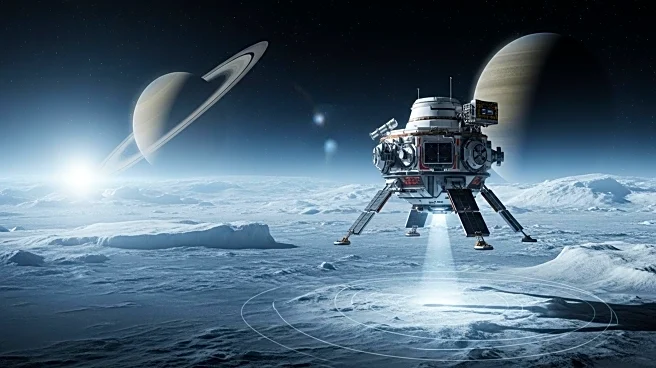What's Happening?
Scientists have found compelling evidence that Saturn's moon Enceladus may be habitable. Research indicates that the molecular building blocks necessary for life are readily available on the moon. This discovery stems from data collected by NASA's Cassini spacecraft, which identified a vast salty ocean beneath Enceladus' surface. The ocean ejects ice grains through cracks near the moon's south pole. These grains contain five of the six essential elements for life: carbon, hydrogen, nitrogen, oxygen, and phosphorus. Recent studies have confirmed the presence of organic molecules, potentially including nitrogen and oxygen, in freshly ejected ice grains. This suggests that these compounds originate from Enceladus' ocean rather than being a result of space weathering.
Why It's Important?
The discovery of life-supporting molecules on Enceladus has significant implications for the search for extraterrestrial life. It suggests that the moon could potentially host life, given its liquid water, hydrothermal energy sources, and chemical composition. This finding challenges existing notions about where life can exist and expands the scope of astrobiological research. If life is not found on Enceladus despite the favorable conditions, it could prompt new questions about the prerequisites for life and the uniqueness of Earth's biosphere. The research also underscores the importance of continued space exploration and the potential for future missions to further investigate Enceladus and similar celestial bodies.
What's Next?
Future missions to Enceladus could focus on directly sampling the moon's ocean and ice grains to search for signs of life. Such missions would require advanced technology to penetrate the ice and analyze the subsurface ocean. The findings could influence the planning and prioritization of space exploration missions by agencies like NASA and the European Space Agency. Additionally, the scientific community may increase efforts to study other icy moons in the solar system, such as Europa, to compare their potential habitability. These endeavors could lead to a deeper understanding of life's potential beyond Earth.
Beyond the Headlines
The discovery on Enceladus raises ethical and philosophical questions about humanity's role in the universe and the potential impact of discovering extraterrestrial life. It challenges the anthropocentric view of life and could influence cultural and religious perspectives on humanity's place in the cosmos. The research also highlights the importance of international collaboration in space exploration, as understanding extraterrestrial environments requires diverse expertise and resources. The potential for life on Enceladus may also drive technological advancements in space travel and astrobiology, fostering innovation and scientific progress.










